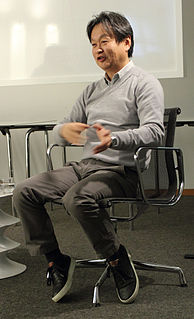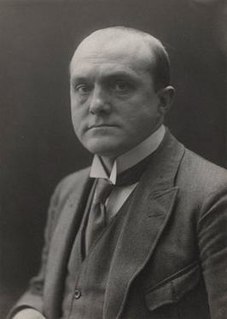A Quote by Robert Hughes
Essentially, perspective is a form of abstraction. It simplifies the relationship between eye, brain and object. It is an ideal view, imagined as being seen by a one-eyed, motionless person who is clearly detached from what he sees. It makes a God of the spectator, who becomes the person on whom the whole world converges, the Unmoved Onlooker.
Related Quotes
God is not a person; God is manifestation itself. We think that God is a superhuman person, but God is not a person. He is not a subject. We can never experience God in a subject/object experience. God is what makes a subject/object experience possible. We can never see God or experience God as separate from ourselves. God is a being but there is no division.
The perspective of eternity is not a perspective from a certain place beyond the world, nor the point of view of a transcendent being; rather it is a certain form of thought and feeling that rational persons can adopt within the world ... Purity of heart, if one could attain it, would be to see clearly and to act with grace and self-command from this point of view.
There has certainly been a great deal of work addressing the relationship between naturalism and the first-person perspective. Quite a number of philosophers have suggested that there are features of the first-person perspective that naturalism just cannot accommodate, whether it be qualitative character, or consciousness, or simply the ability we have to think of ourselves in a distinctively first-person manner.
The great and secret message of the experiential mystics the world over is that, with the eye of contemplation, Spirit can be seen. With the eye of contemplation, the great Within radiantly unfolds. And in all cases, the eye with which you see God is the same eye with which God sees you: the eye of contemplation.
In my view, philosophers have shown a great deal more respect for the first-person point of view than it deserves. There's a lot of empirical work on the various psychological mechanisms by way of which the first-person point of view is produced, and, when we understand this, I believe, we can stop romanticising and mythologising the first-person perspective.
The individual representation of the object, treated sympathetically or antipathetically, is highly necessary and is an enrichment to the world in form. The elimination of the human relationship causes the vacuum which makes all of us suffer in various degrees - an individual alteration of the details of the object represented is necessary in order to display on the canvas the whole physicals reality.
I wanted to make a site where I wasn't mailing physical things to people, but I was still giving people things, and I would have this relationship with that person, and if that person was interested in the object, they would have to email me and I would send that object digitally to them. So, I wanted the relationship with that person, however brief, and I wanted to spread the digital record of the things I have.
In literary representation, the distinction between the genuinely erotic and the licentious is a distinction not of subject-matter, but of perspective. The genuinely erotic work is one which invites the reader to re-create in imagination the first-person point of view of someone party to an erotic encounter. The pornographic work retains as a rule the third-person perspective of the voyeuristic observer.



































